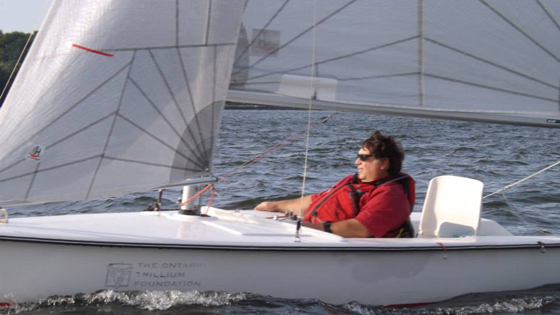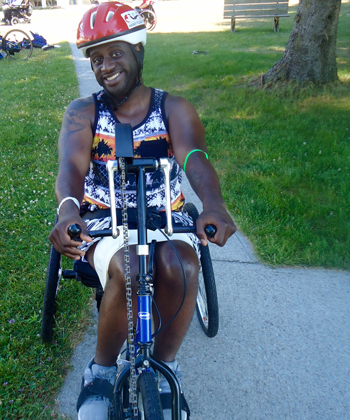
Steve Franczuz, who participated in the SCRP Cottage Program in 2008 after a spinal cord injury, is now a participant and volunteer at Hamilton’s Able Sail Program. (Courtesy: Steve Franczuz)
In 2008, Steve Franczuz was involved in a car accident that shattered his pelvis, causing paralysis of his lower limbs and making him a person with paraplegia.
That same year, Steve participated in Toronto Rehab's annual Spinal Cord Rehab Program's (SCRP) Cottage Program during his inpatient stay at Lyndhurst Centre.
The SCRP Cottage Program, which marked its 20th anniversary this year, invites up to twenty patients annually to the CNIB Lake Joseph Centre: a fully accessible recreational facility in Mactier, Ontario.
For four days, the participants engage in a variety of recreational activities including handcycling, kayaking, swimming, archery, mountain biking, bocce ball and many others. The participants are either current or recently discharged
Spinal Cord Injury (SCI) rehab patients of Lyndhurst Centre.
"It benefited me in so many ways. The recreational part of it was amazing; I didn't have to think about my injury or disability," says Steve. "It was just about having fun and being with a group of people and having a lot of time to share things."
"It really opened my eyes to how different the experience of the program is for different people. Some were into it for the recreation, others for the competition, and others for spiritual healing. I was very moved by what I saw happen there."
Inspired by the SCRP program, Steve proceeded to volunteer at Holland Bloorview Kids Rehabilitation Hospital once a week to help children develop their mobility. He also became involved with the Hamilton Able Sail Program, a program he is still with today both as a participant and a volunteer.
Shifting the focus from 'cannot do' to 'can do'
Charlene Alton is a Certified Therapeutic Recreation Specialist at Lyndhurst Centre, and one of the key organizers of the annual SCRP Cottage Program.
"The focus of the program is on what our patients can do rather than what they cannot do".
"The participants are thrilled to find that they can participate in many of the activities offered and are excited to learn about the specialized leisure equipment that will assist them in doing so," says Charlene.
"The participants always come back and say we've reopened their leisure world and that they have much more to look forward to upon discharge back into the community."
Therapeutic recreation is a profession directed towards functional interventions, leisure education and fostering participation opportunities. Recreation therapists work with Lyndhurst patients to maximize their independence in leisure, optimal health and the highest possible quality of life.
Julian's cottage experience
When Julian Bailey fell off a ladder while working, he hit his head and dislocated his spinal cord, causing paralysis of his lower body.
Two months into his stay at
Toronto Rehab's Lyndhurst Centre, his recreation therapist suggested Julian try a new challenge. He was asked if he would like to apply for the SCRP Cottage Program.
"The cottage program really allows people to think outside the box. Experiencing the outdoors as a paraplegic or quadriplegic is a really good experience," explains Julian, who is a person with paraplegia.
"It's so good to see that you can do things as you did before even though you have a disability."
Preparing participants for positive quality of life after discharge
The SCRP Cottage Program has two sessions every summer, each organized and run by a recreation therapist, and supported by an interprofessional team. This team includes two nurses, physiotherapist (PT) or occupational therapist (OT), a PT or OT's assistant, and a therapeutic recreation student.
"The goal is to impact the participants' lives and help them make the most of the potential and opportunities they have," says Charlene, who attends one of the two sessions every year.

Julian Bailey, pictured here handcycling, was asked to participate in this year's SCRP Cottage Program after sustaining an injury to his spinal cord. (Photo: Charlene Alton)
The SCRP Cottage Program was developed based on research demonstrating the benefits of Outdoor Experiential Therapy (OET) for patients with spinal cord injury. The benefits include social and psychosocial benefits such as a positive impact on self esteem, self actualization and self confidence, and the fostering of learning activities for independent involvement in the community.
"The cottage program really opened my eyes. I can see that I can do so many things now," says Julian.
"It showed me that even people who are less physically capable can still do the same things – it just might be in a different way."
The annual SCRP Cottage Program is supported by the Toronto Rehab Foundation and uses equipment provided by Motion Specialities.
The SCRP Cottage Program's objectives include:
-
Promoting post-traumatic growth through outdoor experiential therapy that helps participants discover untapped potential
-
Demonstrating increased adjustment to disability through recognition of leisure benefits derived from social networking and peer mentorship
-
Increasing self-efficacy through transference of skills learned from inpatient and/or outpatient rehabilitation to a community setting
-
Engaging in an intensive and continuous learning experience to carryover for ongoing community involvement
